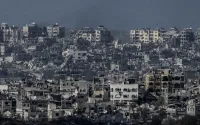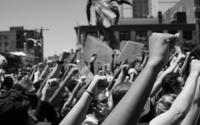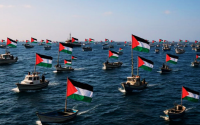Znet / The Guardian13 April 2004
I first encountered the phenomenom of Victim's Licence when arguing on a radio show with a British importer of mahogany from the Amazon. I had pointed out that the timber cutters who supplied him were hiring gunmen to shoot indigenous people. "Well," he replied, "life is cheap in Brazil". I told him that was a shocking thing to say. "Don't you lecture me about human rights," he snapped. "My parents were killed in the Holocaust."
And of course he put me on the back foot. I mumbled something to the effect that he of all people should know the consequences of waiving the value of human life. But despite his evident hypocrisy he had acquired moral authority: he had suffered horribly as a result of mass murder; I had not.
It's partly for this reason that we overlook the atrocious crimes committed by the government of Rwanda. Over the past fortnight, as we commemorated the Rwandan genocide of 1994, the Kagame government's foreign policy was all but ignored. The good guys were murdered by the bad guys; the good guys fought back, drove the bad guys out, formed a new government, and peace came to a troubled land. This is the story our fairytale view of history demands: the victims remain victims, the aggressors remain aggressors. They are permitted to change places only when, like the Afghan mojahedin, they find themselves on the wrong side of the geopolitical fence. Until then, the crimes the victims might commit are licensed by compassion and embarrassment.
After the genocide in Rwanda, many of the perpetrators - assisted, disgracefully, by French soldiers - fled to what is now the Democratic Republic of Congo (DRC). Paul Kagame's Rwandan Patriotic Front (RPF) chased them over the border, helped Congolese rebels to capture much of the east of the country, and, in 1997, overthrew president Mobutu. Hunting down the genocidaires and deposing the president who sheltered them could both be judged legitimate means of securing peace in Rwanda, but Paul Kagame's army also had other interests.
The misfortune of the Congolese is that they possess tremendous natural wealth. This means, as it has meant in all such places, that they are perpetually exposed to theft, expulsion, slavery and murder. We know all about the crimes of men like King Leopold II of Belgium and President Mobutu. We are less ready to notice the crimes of Paul Kagame.
Six foreign armies have been involved in the theft of the DRC's resources over the past ten years, but Rwanda's was singled out by the UN's report on the catastrophe there for the "institutional" nature of its piracy.1 The plunder was not caused by an ill-disciplined army running out of control. It was a deliberate policy, commissioned and implemented by the Rwandan government.
By 1999, the "Congo Desk" of the Rwandan army was generating 80% of the Rwandan military budget - some $320 million. This is the equivalent of 20% of Rwanda's gross national product.2 The money came principally from two sources: diamonds and coltan. Coltan is the ore from which tantalum, the expensive metal used in mobile phones, is extracted, and almost all of it comes from the DRC.
Sixty to seventy per cent of the coltan exported from the eastern Democratic Republic of the Congo, the United Nations reported in 2002, has been mined "under the direct surveillance" of the Rwandan army. Most of the rest was produced by subcontractors and companies answerable to the army or to other departments of the Rwandan government.3 Kagame's people, in other words, had a near-monopoly on global coltan production.
After fighting off the Ugandan army in June 2000, the Rwandan forces managed "to funnel all the diamonds in Kisangani [in eastern DRC] through the Congo Desk".4 Local diamond traders were forced to sell to the contractor nominated by the Rwandan army, and at prices set by the desk. The Rwandans appear to have been stealing about $2 million worth of diamonds a month. The army also captured almost all the eastern Congo's public funds, taxing the people and seizing the revenues from water, electricity, roads and airports.
The RPF's original excuse for intervention disappeared pretty rapidly - in fact it soon linked up with the Hutu killers it was supposed to be hunting, and used them to help control the region. Instead, according to the UN, "With minor exceptions, the objective of [its] military activity is to secure access to mining sites or ensure a supply of captive labour."5 On the shores of Lake Tanganyika, according to a report by the Catholic Church, Rwandan soldiers tortured, raped and murdered local people.6
In the Guardian ten days ago, Alison des Forges wrote "There is no equivalence, of course, in the kind of crimes charged to the RPF and the crime of genocide."7 It's true that the Rwandan army never sought to exterminate the people of the eastern Congo. It is also true that its displacement of local people, who fled as it burned their villages and seized their resources, caused more deaths than the Interahamwe. The militias murdered around 800,000. In the DRC, the UN suggests, over 3.5 million deaths in excess of previous levels of mortality "occurred from the beginning of the war up to September 2002. These deaths are a direct result of the occupation by Rwanda and Uganda." 8
Kagame formally withdrew his troops from the DRC in 2002, but before doing so he made sure that its wealth continued to flow into Rwanda. He replaced the Congolese bosses of public utilities with his own people, put the soldiers running the coltan mines in civilian clothes and inserted his troops into local forces.9 The prosperity which has helped to secure peace in Rwanda derives in large part from the plunder which has helped to sustain war in the DRC.
So last week we saw one of the world's bloodiest war criminals standing in the national stadium in Kigali, holding a red rose and announcing that "We cannot turn the clock back ... but we have the power to determine the future and to ensure that what happened never happens again."10 No one complained. No one pointed out that, thanks to his army, it has already happened, again and again. By preserving the fairytale, we license the victim to keep committing the crime.
It is arguable that nothing so endangers world peace and human rights as official victimhood. Hitler played upon the German people's grievances about the reparations exacted from them after the first world war. The allies overlooked the expulsion of three million Sudeten Germans from Czechoslovakia after the second world war. The Israeli government insists that anyone who criticises its human rights record is "anti-semitic", a participant, in other words, in the oppression of the Jews. George Bush claims that America has a right to take its war on terror wherever he pleases, as a result of the atrocity it suffered in 2001. We must never forget the appalling crimes from which they draw their licence. But if we really wish to ensure that it "never happens again", we must judge people by what they do rather than by who they are.
www.monbiot.com
References:
1. United Nations Security Council, October 2002. Final report of the Panel of Experts on the Illegal Exploitation of Natural Resources and Other Forms of Wealth of the Democratic Republic of the Congo. UN, New York. 2. ibid.3. ibid.4. ibid. 5. ibid. 6. ibid. 7. Alison Des Forges, 3rd April 2004. Remembering Rwanda. The Guardian. 8. United Nations Security Council, ibid.9. ibid. 10. BBC News Online, 7th April 2004. Excerpts: Kagame marks genocide. http://news.bbc.co.uk/1/hi/world/africa/3609001.stm






